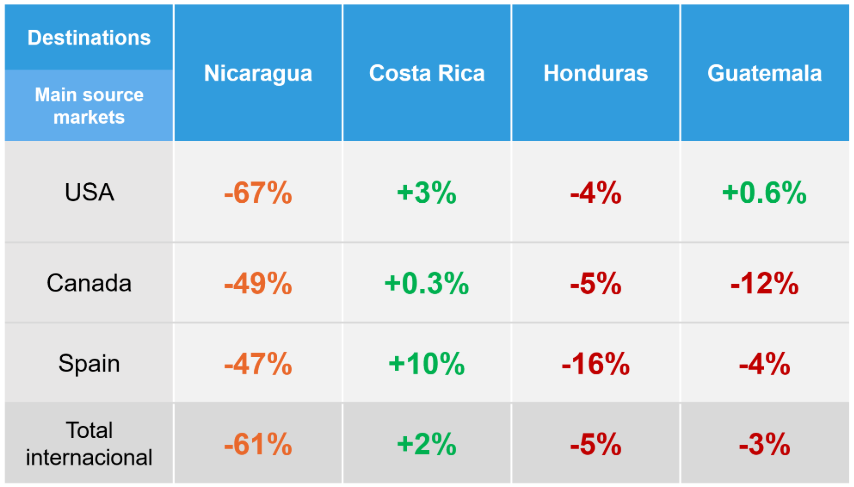Summary:
- Political unrest in Nicaragua has had "a devastating effect on tourism", with international arrivals plummeting by -61% in the Apr-2018 to Jul-2018 period, according to ForwardKeys;
- The Central American country had been working hard to reinvent itself after years of conflict, but the revolt against President Daniel Ortega has plunged the country into crisis;
- Tourism is a vital industry in Nicaragua, as it is responsible for 15% of the country's export revenue, according to the World Travel & Tourism Council (WTTC);
- Statistics support principle that domestic political unrest will almost always puts a destination in a bad light and damages tourism.
Tourism is a vital industry in Nicaragua, as it is responsible for 15% of the country's export revenue, according to the World Travel & Tourism Council (WTTC). Ahead of the troubles, WTTC had expected Nicaragua's visitor exports to grow at 7.7% in 2018. The Blue Swan Daily analysis of OAG schedule data shows that system capacity has grown by more than a half over the past three years, with year-on-year rate rises of +29.2% in 2015, +9.2% in 2016 and +7.8% in 2017.
The Central American country was working hard to reinvent itself after years of conflict and the statistics seem to suggest it was making progress. However, the revolt against President Daniel Ortega has plunged the country into crisis as more than 300 people have been killed since April. According to a recent statement by the Inter-American Commission on Human Rights (IACHR) the number of people who have died during the unrest that has afflicted Nicaragua since Apr-2018, stands at 322, 21 of whom were police officers and 23 of whom were children or teenagers.
Local tourism sources confirm that the turbulence has hit the industry hard with more than four in five small hotels forced to close and around a third of restaurants pulling down their shutters. Estimates suggest that of the 120,000 people employed in the tourism sector, more than half are now out of work and losses are thought to have surpassed USD200 million.
The main source markets for visitors to Central America and the Caribbean are the USA, Canada and Spain and data from ForwardKeys for Nicaragua show they are all are down by significant levels. Arrivals from the USA down -67% from Apr-2018 through Jul-2018, according to its data analysis, while Canada is down -49% and Spain down -47%.
TABLE - Nicaragua has seen a notable decline in air arrivals from its largest source markets, as have some of its neighbours Source: ForwardKeys (data: Apr-2018 - Jul-2018 YoY variations)
Source: ForwardKeys (data: Apr-2018 - Jul-2018 YoY variations)
Tourism to Honduras, which borders Nicaragua to the north-west and to Guatemala, which borders Honduras to the north-west both appear to have been affected by their proximity to the troubles, according to ForwardKeys, albeit not to a similar level. Its analysis shows arrivals in Honduras were down -5% and in Guatemala were down -3% over the same period. Costa Rica, which borders Nicaragua to the south, has not been so badly affected; its visitor arrivals were up +2%, benchmarked against the equivalent period last year.
"The reports and images coming out of Nicaragua are just dreadful. Even though tourists are not the focus of the violence, what we are seeing is a clear demonstration of the principle that domestic political unrest almost always puts a destination in a bad light and damages tourism," says Olivier Jager, CEO, ForwardKeys.